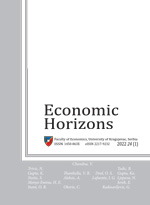INCOME TAX MANAGEMENT IN BANKS IN THE REPUBLIC OF SERBIA
Violeta Todorovic, Jasmina Bogicevic and Stefan Vrzina
Faculty of Economics University of Kragujevac, Kragujevac, The Republic of Serbia
Income tax management includes a set of activities aimed at the legal minimization of income tax liabilities. Due to the tax law flexibility and cross-country differences in income taxation, banks may be in a position to significantly reduce their tax burden. An objective of the paper is to calculate the effective income tax burden of banks in the Republic of Serbia and examine the impact of income tax on banks’ operations. A research study conducted on a sample of banks between 2010 and 2016 shows that the effective income tax rate in banks is well below the statutory rate, mostly due to the use of government tax incentives. Furthermore, 25% of the observations have an effective tax rate of 0% despite the reported pre-tax income. The latest increase in the statutory tax rate in the Republic of Serbia has not had an impact on bank leverage, either in the short or long term. This may be an indicator that tax shield effects are not considered when the statutory tax rate is relatively low. The paper also finds that the effective tax rate is not correlated with bank profitability.
Keywords: income tax, tax management, effective tax rate, financial structure, profitability, banks
JEL Classification: G21, G30, H25, H26




